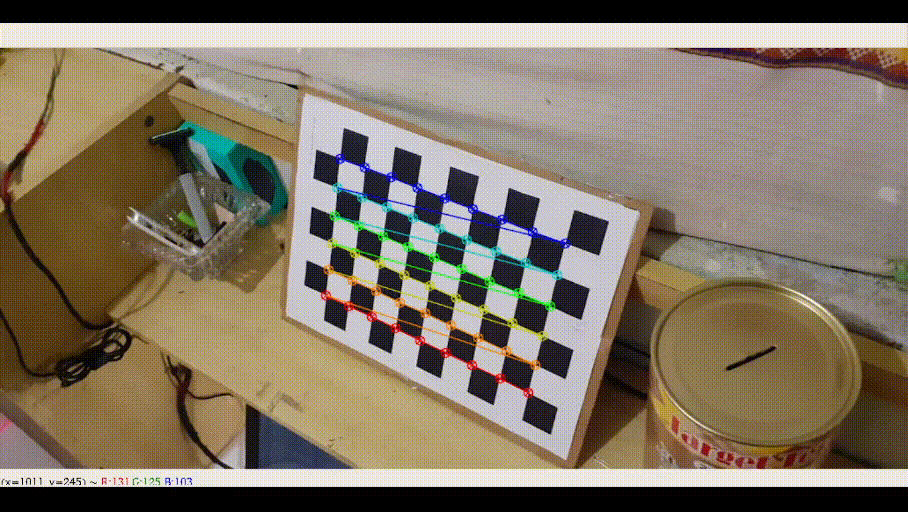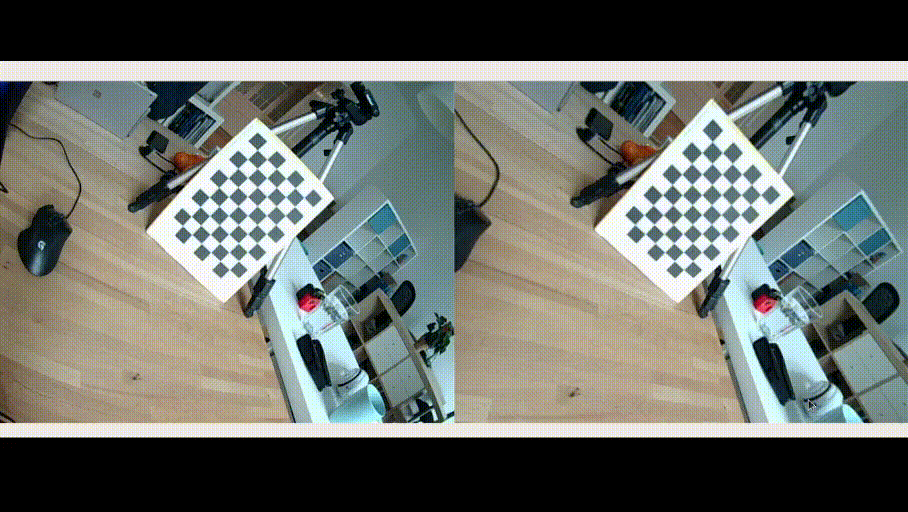This repository contains code for calibrating monocular cameras with a chessboard pattern.
In order to calibrating the camera you can put the calibration photos into a separate folder (like demo or yourfolder) or take pictures using a webcam. To take pictures using the webcam you can run the code get_images.py
You have to install some libraries first, run the code below:
pip install -r requirments.txt
The code below can be run to take pictures via webcam. Press s to save the image and q to end the program.
python src/get_images.py ./directory_to_save start_index prefix
python src/get_images.py ./data 0 images_webcam
The purpose of camera calibration is to generate an intrinsic matrix (K). The program below will take the input image and generate a calibration matrix in yml file.
python src/calibration.py \
--image_dir ./demo/data01 \
--image_format png \
--prefix img \
--square_size 0.025 \
--width 9 \
--height 6 \
--save_file ./demo/calib_data01.yml
usage: src/calibration.py [-h] --image_dir IMAGE_DIR --image_format
IMAGE_FORMAT --prefix PREFIX
[--square_size SQUARE_SIZE] [--width WIDTH]
[--height HEIGHT] --save_file SAVE_FILE
optional arguments:
-h, --help show this help message and exit
--image_dir IMAGE_DIR
image directory path
--image_format IMAGE_FORMAT
image format, png/jpg
--prefix PREFIX image prefix
--square_size SQUARE_SIZE
chessboard square size
--width WIDTH chessboard width size, default is 9
--height HEIGHT chessboard height size, default is 6
--save_file SAVE_FILE
YML file to save calibration matrices
The calibration file yml contains an intrinsic matrix (K) and a distortion matrix (D). As below:
%YAML:1.0
---
K: !!opencv-matrix
rows: 3
cols: 3
dt: d
data: [ 8.2074718315015139e+02, 0., 5.2705661714841142e+02, 0.,
8.2003814588104046e+02, 2.3642917366196548e+02, 0., 0., 1. ]
D: !!opencv-matrix
rows: 1
cols: 5
dt: d
data: [ 3.0124329351197032e-01, -1.7139992852268171e+00,
2.5721068961795258e-03, 2.7230187591786039e-03,
4.5098343258595559e+00 ]
One of the uses of a calibration matrix is for image distortion, the image on the left is a distorted image, while the right is an image that has been undistorted, such as:
In order undistortion image with calibration matrix, run:
python src/undistortion.py \
--image_dir ./demo/data01 \
--calib ./demo/calib_data01.yml \
--output_dir ./demo/newdata01
You can also run programs using docker. Follow the commands below.
Pull docker image, run:
docker image pull ruhyadi/calibration:latest
To make running the program easier, run runDocker.sh. If permission is denied run chmod +x runDocker.sh first.
./runDocker.sh
After that you will enter the docker terminal. Run the command below to calibrating camera.
python src/calibration.py \
--image_dir ./demo/data02 \
--image_format jpeg \
--prefix M30_ \
--square_size 0.025 \
--width 9 \
--height 6 \
--save_file M30_calibration.yml

